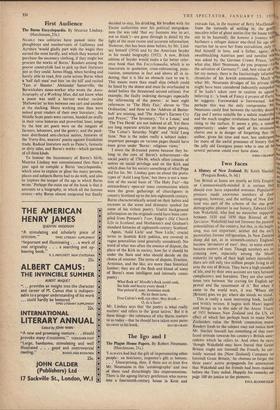First Audience
The Barns Encyclopaedia. By Maurice Lindsay. (Hutchinson, 25s.) The Barns Encyclopaedia. By Maurice Lindsay. (Hutchinson, 25s.)
NEARLY two centuries have passed since the ploughboys and maidservants of Galloway and Ayrshire 'would gladly part with the wages they earned the most hardly, and which they wanted to purchase the necessary clothing, if they might but procure the works of Burns.' Readers among the poorer countryfolk had to pick up their literature just as they could. James Hogg, when herding and barely able to read, first came across Burns when a 'half daft man' met him 'on the hill' and recited 'Tam o' Shanter.' Alexander" Somerville, the Berwickshire stone-worker who wrote the Auto- biography of a Working Man, did not know what a poem was until a harvest worker recited 'Hallowe'en' to him between one cart and another at the stacking. Many working men then were indeed great readers of their own literature : the Middle Scots poets were current, handed on orally in their verse histories and proverbial lines; songs by the best art poets were on the tongues of farmers, labourers, and the gentry; and the pack- men distributed anti-clerical satires, histories of the 'Forty-five, weavers' poems against fraudulent trade, Radical literature such as Paine's, fantastic or dirty tales, and Burns's works—which partook of all these kinds.
To honour the bicentenary of Burns's birth, Maurice Lindsay was commissioned (less than a year ago) to compile a Burns 'encyclopaedia,' which aims to explain or gloss the many persons, places and subjects Burns had to do with, and also to 'explore the temper of the age in which Burns wrote.' Perhaps the main use of the book is that it amounts to a biography, in which all the famous cruxes—why Burns almost emigrated but finally
decided to stay, his drinking, his brushes with the Excise authorities over his political outspoken- ness (he was told 'that my business was to act, not to think')—are gone through in detail by the light of the most recent and accurate information. However, this has been done before, by Mr. Lind- say himself (1954) and by the American Snyder in his model biography (1932). A new, British edition of Snyder would make a far better refer- ence book than this Encyclopaedia, which is so inaccurate in quotation, cross-referencing, punc- tuation, sometimes in fact and above all in in- dexing, that it is like an obstacle race to use it. This means more than small slips (which could be listed by the dozen and must be overhauled in detail before the threatened second edition). For example, the faulty indexing damages especially the referencing of the poems : at least eight references to 'The Holy Fair,' eleven to 'The Ordination,' and three to the 'Address of Beelze- bub' are missing, and 'The Author's Earnest Cry and Prayer,' The Inventory,' To a Louse,' and 'The TWa Herds' are not indexed at all. Yet there are long separate articles on those party pieces, The Cottar's Saturday Night' and 'Auld Lang Syne.' Nor is the index really a subject index : important passages on various pages should have .been given under 'Burns : religious views.'
I stress the ill-treated poems because they be- long to the core of Burns's achievement—the social poetry of 1784-86, which often consists of satires on social privilege and on the Kirk and which does for his society something of what Pope did for his. Mr. Lindsay goes on about the proto- types of 'Auld Lang Syne,' but there is not a men- tion of the social basis of 'The Holy Fair'—the extraordinary open-air mass communions which were the great gatherings of churchgoers in country Scotland up to the late eighteenth century. Burns characteristically seized on their habits and excesses as the scene and dramatic symbol for some of his richest poetry. Useful background information on the originals could have been com- piled from Pennant's Tour, Edgar's Old Church Life in Scotland, and Mathieson's and Graham's standard histories of eighteenth-century Scotland.
Again, 'Auld Licht' and 'New Licht,' crucial terms in Scottish Kirk politics, are covered in vague generalities (and generally unindexed). No word of what was often the essence of dispute, the place of the Kirk in society, how far it should be under the State and who should decide on the choice of minister. The terms of dispute, Erastian, Arminian, and the like, are more than historical lumber; they are of the flesh and blood of some of Burns's most intelligent and intensely comic poetry : What flock wi' Moodie's flock could rank, Sae hale and hearty every shank?
Nae poison'd, sour, Arminian stank He let them taste;
Frae Calvin's well, aye clear, they drank,—
O, sic a feast!
Mr. Lindsay says that 'the poetry is what really matters' and refers to the 'great satires.' But it is these things—the substance of why Burns matters to us today—that he should have taken most pains










































 Previous page
Previous page